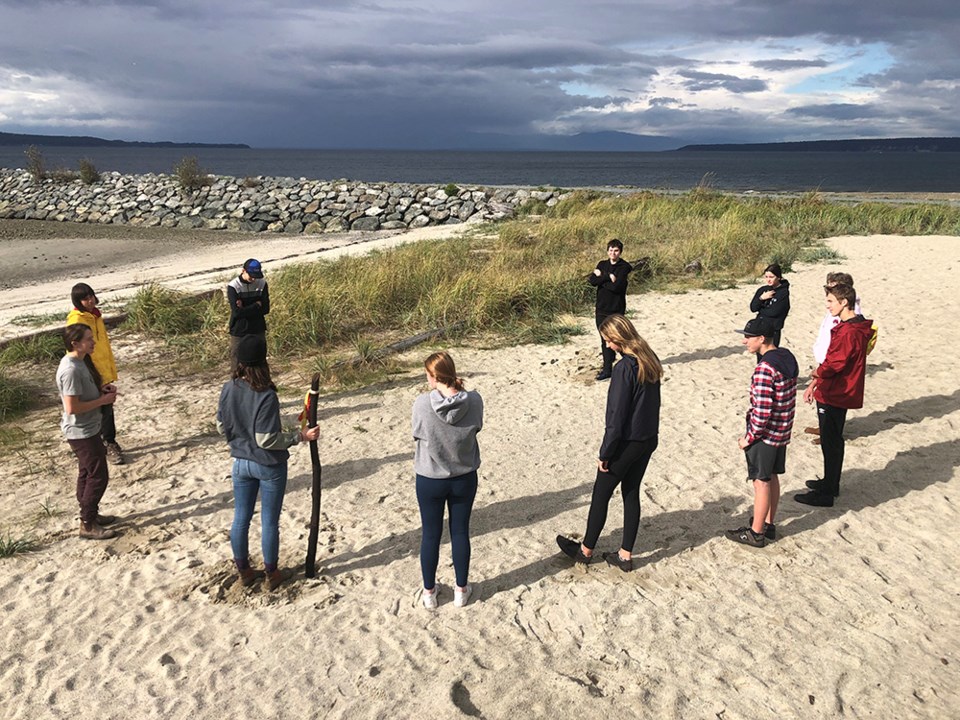Through a School District 47 initiative, career education in BC now has an added dimension to accommodate the green economy.
According to Ryan Barfoot, the project’s lead educator and architect, students across the province can now take their career education courses with a focus on skills for the green economy.
In an interview with the Peak, Barfoot said the final couple of months of the pilot project are currently running, with a cohort of 30 students from around the province. Sessions are taught online and there is also an in-person component when public health officer guidelines allow. The second cohort will be opened up in the fall and will be expanded.
“The big idea is that it is mixed delivery, with kids focusing on the green career component and the skills for the new green economy,” said Barfoot. “That’s what most of our face-to-face and online time is focused on.
“The online aspect has a provincial classroom, so we have students from all over the province who are in the course. Then, students are tasked and inspired to do action projects in their communities. Small groups of students are working on projects with community partners.”
Barfoot said students taking the course will develop skills to seek green economy jobs that currently exist, and that are evolving with changes being seen in the economy.
“We need to make the changes,” said Barfoot. “We are trying to make sure students are prepared for the fact that every sector is going to require trained people who are able to understand the language of sustainability and all of the different concepts around green economies.”
Barfoot said the students who are involved are inspired and have provided lots of good feedback. The need for a revised approach to career education is clear, he added.
Shifting hopes
“If there was ever a thought that business as usual was even a possibility, the litany of stark environmental news, from catastrophic fires, to floods, has certainly shifted our hopes,” stated Barfoot in a media release. “Yet hope is exactly what we need. People wither without hope.”
Barfoot stated that the mental health crisis facing youth is an “epidemic of dismay and a predictable symptom of the issues that face us. Kids need to nurture a sense of hope which can only come through purposeful and directed action, otherwise it’s feeble.”
Barfood stated this innovative pilot is a collaboration of the classrooms to communities (C2C) education network (@C2C_BC) and the leadership ecology adventure program (@LEAPCanada ) of School District 47. C2C supports place-based learning and environmental literacy across the province and has a strong record of supporting professional development for both formal and informal educators provincially.
LEAP runs field schools and leadership clinics and is a program of School District 47, which is reputable as innovative outdoor, ecological and sustainability education, stated Barfoot. C2C and LEAP have worked collaboratively in the professional development realm, but this is their first foray into a youth-offering of this scale, he added.
“High school students and teachers are yearning for this kind of program that reinvents career education, inspires action and nurtures leadership around climate and other imperatives of our time,” stated Patrick Robertson, chair of the C2C education network.
Barfoot stated that for people to thrive, they need to be able to envision their future.
“I sense that young people need to see themselves in a meaningful career that supports sustainability instead of perpetuating collapse,” stated Barfoot.
Green careers
A key element in the green careers experience is to highlight early-career green professionals, so students can see that green careers exist in all sectors of the economy and that green skills are relevant as they move toward graduation and establishing a career, he added.
Students enrolled in the courses have had the fortune of learning from the following green professionals: Anastasia Lukyanova (City of Powell River sustainability planner); Tyler Bartfai (hatchery technician and community liaison, Pacific Salmon Foundation); Graham May (charity lawyer and activist); Ashton Kerr (program manager, Lower Mainland green team); Lauren Eckert (conservation scientist, National Geographic Explorer); Cecilia Jaques (climate and energy advisor, City of Nelson).
“We need to act as though our life depends upon it – because it does,” stated Barfoot. “The climate is changing before our eyes.”
The fact that Canada is signatory to numerous international agreements requiring Canada to aggressively reduce carbon emissions signals an immediate need to build a workforce whose understanding of sustainability is the baseline, he added. This sentiment is also backed by a recent study by Eco Canada, which projects a 44 per cent increase in environmental jobs between 2020 and 2030, according to Barfoot.
“This course has helped me realize the huge variety of ways to live my life and find a meaningful career,” stated student Aura Dyck. “I am so excited for what the future may hold, and through this work, I am confident I will be able to carve a sustainable, impactful path for myself."
Effectively shifting to a green economy will take a massive and concerted effort by the public and private sector, both of which are scrambling to meet climate obligations, stated Barfoot. He suggested that moving forward, “every career needs to be a green career.”
When young people enter the workforce, they will be poised to be a leading part of this movement, he added.




